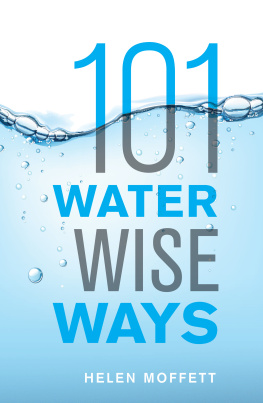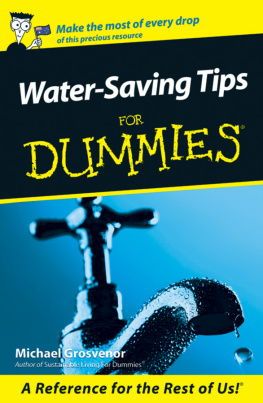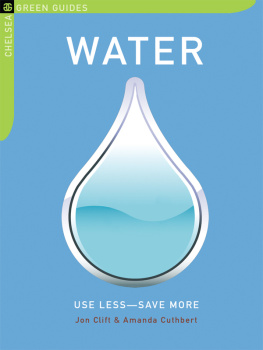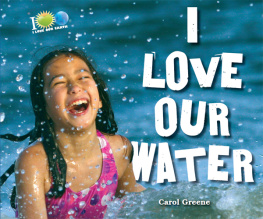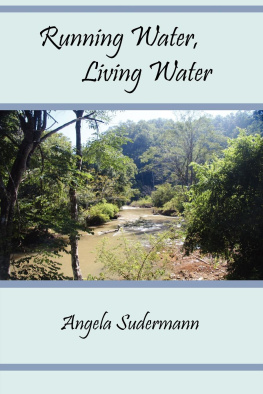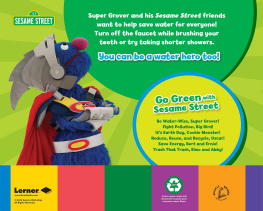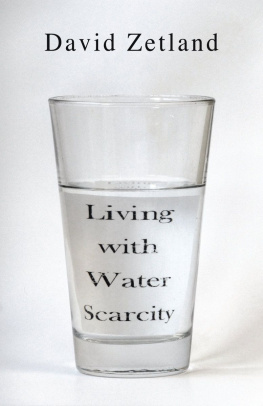

HELEN MOFFETT

Helen Moffett, 2018
All rights reserved. No part of this book may be reproduced or transmitted in any form or by any means, electronic or mechanical, including photocopying, recording or any information storage or retrieval system, without permission from the copyright holder.
ISBN: 978-1-928257-54-7
e-ISBN: 978-1-928257-55-4
Published by Bookstorm (Pty) Ltd
PO Box 4532
Northcliff 2115
Johannesburg
South Africa
www.bookstorm.co.za
Edited by Russell Clarke and Paige Nick
Proofread by Wesley Thompson
Cover and book design by mr design
Ebook by Liquid Type Publishing Services
For more information on Helen Moffett, visit
www.helenmoffett.com
For Justin and Fiona, the Well Angels, with thanks from the Water Lily.
CONTENTS

INTRODUCTION
WHY OUR RELATIONSHIP WITH WATER NEEDS TO CHANGE
Cape Town is in crisis: after years of drought, it faces the very real possibility that its taps will run dry as dams and reservoirs drop below critical levels. The threat of Day Zero switching off municipal water supply, after which residents will have to queue for a daily allotment of 25 litres per person hangs over the city. Is this a once-off? Watergeddon? Will the winter rains come in time to save us?
The reality Capetonians face now is going to keep rearing its head. Were using too much water at the same time that supplies are starting to dwindle for a whole range of reasons (climate change, for a start). We may get lucky this time we might still get good winter rains but this issue isnt going away.
But this isnt a reason for doom, gloom and despair. Its a unique opportunity for everyone to rethink the way we interact with this most precious resource: from the way we wash ourselves and our clothes, eat, cook, clean, use the toilet, to how we build our houses, design our cities and grow our food in the future.
Cape Town is famous for its beauty, infamous for its history, plagued by a host of social ills and wounded by extreme inequality. How its citizens act in the face of this crisis could become a model for all cities, around the globe, as they also start to struggle with water scarcity.
We live in an arid country on a planet with finite resources. As I write this, three provinces in South Africa have been declared national disaster zones because of drought. The way we think about water needs to change, and fast. This is especially true for those of us who have running water and flush sanitation piped into our homes. For millions of South Africans, water is already a precious resource that costs toil to collect and fuel to heat. Our middle-class expectations that water will gush steaming from our dozens of indoor taps 24/7 are going to look as bizarre to future generations as the spectacle of Cleopatra bathing in asses milk. Our Roman-orgy relationship with water is over.
Theres no doubt about it, our grandchildren are going to think were insane:
Wait, you kept huge bodies of water in your backyards just so you could swim in them for a few months of the year? You peed in drinking water? You showered or bathed every day? You had bedrooms with bathrooms attached? What do you mean, architects were allowed to design houses where gutters just carried water away into the ground? You had garages for your cars, but no water tanks? Were you people completely crazy?
One problem is that for good reason everyone needs it for life, health and dignity water is incredibly cheap. Access to water is universally recognised as a human right. Without it, we die. Whats more, even if we have water, unless its clean and safe to drink and use, we also die, as many cholera epidemics and the movie Erin Brockovich taught us. This is why, with a few exceptions, providing water is the job of governments and municipalities, which are required to keep the cost as low as possible. However, the fact that our treated water costs pennies, in a world that respects cold cash, means that we dont value it.
Another issue, and this is true for many countries, is that we have a system in which water treated so that its safe for drinking and cooking is used for everything: we toss this life-giving and life-saving resource casually onto our gardens, into our pools, down our toilets. Think of the poster of the small African child asking the Western aid worker, You have so much clean drinking water, you POOP in it?
This leads to the next problem: water is linked to some of our most private bodily functions defecating and urinating, menstruating, even vomiting. In the last two generations, in most Westernised cultures, weve been able to take these unavoidable biological processes behind closed doors and to our porcelain thrones. Water makes everything nasty and messy go away. We flush, and forget about it. Thinking about the water crisis means we have to face these earthy realities, and wed much rather not.
In this book and in our water-wise future, were going to have to be tough in facing these realities. Were going to have to consider what to do when we have a tummy bug, or a period, or an incontinent family member. Apologies in advance if this causes offence, but I will be using the word shit to describe, well, shit this is no time to be dainty about No 2s, poo makes me think of nursery school, and faeces is a bit intimidating, as well as tricky to spell.
The recent panic buying and illegal stockpiling of water is likely related to real terror at the prospect that come Day Zero, Capetonians will not be able to flush their toilets. Many have realised, with dismay, for the first time, just how much water this uses: 5 to 9 litres every time we touch that handle.
This book will hopefully help to alleviate water panic and distress. A can-do compendium, its meant to be a guide, not prescriptive not all solutions or tips are one-size-fits-all. Think of it as an ally in your fight to save water, and part of your survival kit, along with the first-aid box; Valium for water-worriers.
In it are the best tips found so far: from the tiny (but every bit helps) to the huge and long-term. Some tips will cost money to implement; many are free. Some depend on individual circumstances (whether you have a garden, for instance); some apply to everyone. Youll find hints on everything water-related, from ingenious new ways of showering to laundry short-cuts, from practising good water hygiene to building your own dry urinal. There are tips for kids, families, elders, guests, tourists; for homes, kitchens, offices, businesses, institutions. And these are just a start: refine them, adapt them to your specific situations, and add to them.
This is a marathon, not a sprint; we may even find that were in for the Comrades. So dont be surprised if you get water fatigue. Dont worry if you struggle at first to adjust; your new water-wise ways will soon become second nature.
Be aware that the way the middle classes are going to have to adapt is already daily life for millions of South Africans. Many queue for scarce water at standpipes and wells, and bear the burden of carrying it home, storing it and heating it. For some of us, its a humbling experience to consider that Day Almost Zero is reality for countless families.
Next page
